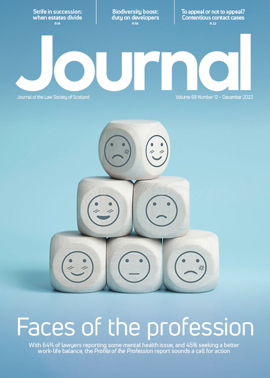Periti credere? [Experts believe]

JQ v CC, Glasgow Sheriff Court, 1 March 2016 (available on the Scottish Courts website) provides insight into how the bench views the involvement of expert witnesses in family cases, as well as being of interest in relation to child relocation. Sheriff Anwar’s judgment is significant not only in underlining that a child’s best interests do not necessarily align with the interests and wishes of the parent with care, but also as one of the first to consider the application of Kennedy v Cordia (Services) [2016] UKSC 6 regarding the role of expert witnesses.
Kennedy set out the considerations governing the admissibility of expert evidence, distilled as:
- whether the proposed evidence will assist the court in its task;
- whether the witness has the necessary knowledge and experience;
- whether the witness is impartial in their presentation and assessment of the evidence; and
- whether there is a reliable body of knowledge or experience to underpin their evidence.
Proper evidence?
In JQ the mother wished to move to the south of England with her sons (by different fathers) aged 10 and four. The fathers maintained that it was in their child’s best interests to retain the status quo (shared care). An expert was instructed jointly to comment on certain detailed questions.
His written report answered the question to be determined by the court – whether the proposed relocation would be in the children’s best interests. The original proof diet was discharged on submissions based on the Inner House decision in Kennedy: the witness had exceeded his remit; further, his evidence would consist of his opinion based on his own experience rather than application of any scientific principle. The fathers then instructed a child psychologist to review the expert’s methodology and comment on his conclusions.
Subsequently the evidence was heard under reservation. While the case was at avizandum the Supreme Court issued its decision in Kennedy. The court noted: “Experts can and often do give evidence of fact as well as opinion evidence. A skilled witness, like any non-expert witness, can give evidence of what he or she has observed if it is relevant to a fact in issue… There are no special rules governing the admissibility of such factual evidence from a skilled witness.”
The sheriff referred to the Supreme Court judgment in deciding not to admit the expert evidence. In her view it was erroneous to assume that psychological evidence was necessary in cases such as this. She stated: “There is a growing practice among practitioners in the sheriff courts to rely upon the evidence of child psychologists in family actions… A child psychologist ought not, in my judgment, to be instructed as a matter of routine, nor should it be the norm, unless there are objectively justifiable reasons for doing so, in the child’s best interests. While each case will turn on its own facts, in the absence of any factual basis for concluding or suspecting that a child is suffering from, or affected by, or is likely to be suffering from or affected by, an underlying psychological issue, requiring the input of a suitably qualified expert, the basis for appointing a child psychologist must be questionable.”
She refused the mother’s craves for specific issue orders on the basis that, from the children’s perspectives, the proposed relocation was not reasonable and, having regard to the welfare principle, the status quo should continue.
Continuing scope
Does this signal the end of the instruction of child psychologists in family actions? Arguably not. They may still have a role, though agents should bear certain considerations in mind when deciding how to present a case and in particular whether a psychologist’s report may be necessary. On one view, Kennedy arguably expands the scope for expert evidence.
- Not all sheriffs have the same level of knowledge. The sheriff sitting in a specialist family court who deals daily with complex child law cases may be more comfortable making decisions without expert input than a sheriff less experienced in such cases.
- Child psychologists can assist not only where children exhibit maladaptive behaviours, but also on how best to minimise the likelihood of future emotional or psychological difficulties where there is a particularly high level of conflict between parents, or significant changes to the status quo are under consideration.
- Careful consideration should be given to their remit, with careful crafting of the letter of instruction to ensure that specific questions are asked, the answers to which will assist the decision-making process in a tangible way.
- If a child psychologist is to be instructed, it may be possible to minimise the length of the proof by issuing a specific remit to the psychologist, use of affidavits, and agreement of as much evidence as possible by way of a joint minute.
Amanda Masson, partner, Harper Macleod. The author acted for one of the fathers in the litigation discussed.
In this issue
- Family ADR: why the slow takeup?
- Electronic cigarettes: the medicine of tomorrow?
- Official advice: must do better
- Privacy Shield, the new Safe Harbor
- Maternity: still black marks
- Designed for justice
- Reading for pleasure
- Opinion: Tim Musson
- Book reviews
- Profile
- President's column
- 20 is the new 40
- People on the move
- Stress: the common enemy
- A safer way to talk
- Mind the gap
- SLCC: a role in standards?
- Budget 2016: a spoonful of sugar?
- Rights lost to sight?
- Take care with care services
- How the Sheriff Appeal Court fits in
- Extended liability?
- Periti credere? [Experts believe]
- What's happening on the review
- Scottish Solicitors' Discipline Tribunal
- Deeds of conditions: emerging stronger
- In-house and staying in demand
- Further warning over historic client balances
- Law reform roundup
- Perceptions and priorities
- Training is the key
- Ask Ash
- By diverse means
- The literal truth






